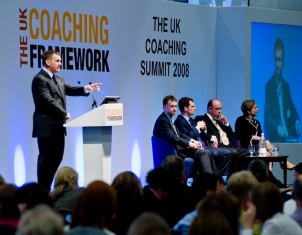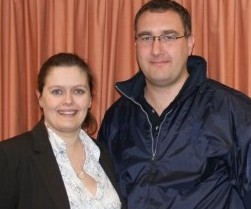
Pat Duffy: "The time has come"
Building a system for UK coaching
Mick Owen visited the third UK Coaching Summit to report on the views from the platform and the views from the floor

Pat Duffy: "The time has come"
There are many ways to judge a conference with the food, the accommodation and ‘the crack’ being high on the conference tart’s tick list. At the third UK Coaching Summit, held on 22 and 23 April, even the most prolific conference-goer would have been moved to comment on the delegate bag, including as it did a copy of The Coaching Framework, a tome that begs the adjective ‘weighty’. The content is perhaps thinner than the spine suggests, with hosts of glossy images, whole pages devoted to what those in the trade call ‘pull quotes’ and a host of complex, multi-coloured diagrams, rather than a deal of text; but if the designers’ brief included the word ‘quality’ then they delivered in spades.
Indeed quality was a word that pervaded the whole event from the cavernous concourse of the Ricoh Arena and the customer-careful staff through to the line up of the keynote speakers. When your m.c. is taking time off from presenting world championship snooker to be with you the standard is set. By the time Ray Stubbs, for it was he, had slickly interviewed key protagonists, introduced films of coaches working at all levels and made a fuss of Olympic medallist Stephen Parry, many of the 560 people in the body of the kirk might legitimately have been thinking about some light refreshment. However, Ray was far from ready to break and his final trick was inviting the chief executives of Sport England, SportScotland, UK Sport and Sportscoach UK to the stage and facilitating a sustained piece of message-giving.
And what a message it is. “The time has come for coaching,” says Pat Duffy of scUK. “We have momentum, direction of travel and everyone is on board,” agrees Stewart Harris from Scotland. “This involves four nations, 29 sports and six strategic areas,” chimes John Steele on behalf of UK Sport with equal passion. The force is very much with them, it seems.
Comparisons can be odious but it must be said that at times Jennie Price seemed like a fish out of water. Duffy, Steele and Harris have all been coaches and it showed. Staying on message is one thing but rehashing the same lines in a different order with no passion for the subject is another, less attractive proposition. With Sue Campbell barrelling to formally launch the document before dinner and bringing with her a burst of dynamic energy and the tacit understanding that the Youth Sport Trust will take care of sport in the education system while the organisations headed by Duffy and Steele have got coaching and elite sport systematised to within an inch of success, the casual observer was led inexorably to the question: “Quo vadis, Sport England?” But nothing could detract from the overall message that huge and exciting change is afoot.
If the opening salvoes and the dinner presentation were aimed beyond the conference hall the workshops and debates were very much for the cognoscenti. The UK Coaching Framework comes with many and complex diagrams. If one were to attempt a diagram of the effect the plan has had, is having and will have it would have to look like a pebble in a pond crossed with an avalanche. The pebble was dropped more than three years ago and its ripples can be marked by the three coaching summits so far, each one widening its circle of influence. But rather than diminishing the further they go from the centre, the UKCF’s ripples pick up energy, people and impact. This conference was aimed at coaching development managers. They know about the UKCF, because they have helped shape it at their level. The next ripple will engulf coach educators who will be gathered up and, as Pat Duffy said in an interview given exclusively to The Leisure Review, be challenged “to really get into the detail of how we are going to develop the workforce going forward”. Duffy is no autocrat. Years spent at the sharp end of coaching have clearly taught him that people need to be recruited, engaged and persuaded to change. When he spoke of the next step he explained that the onus does not lie with the people at the centre: “A major part of what we are trying to do is recruit change teams in the different agencies around the UK. [Those agencies] need to be much clearer how they want to move forward with their own long-term model of coach development. A major part of that for me is they must be engaging with their coach educators who, given our current experience, should be one of the key players in defining how the framework will work in their sport going forwards.”
With the onus now very much on the governing bodies of sport, TLR tracked down two members of the key constituency and asked them why they were in Coventry and what they wanted out of the two days. Liza Baillie of Scottish Squash was clear: “I’m here to see how this all links in to our Coaching Scotland framework and to meet with governing body colleagues to determine how this will work from a ‘squash’ point of view rather than just my governing body’s point of view.” Tim Lumb from cricket had similar aims and added: “Like Squash we are a Trailblazer 1 sport and we have progressed significantly, particularly in the last twelve months around the coaching framework and really embedded it around the way we work, the way we operate. We have restructured in terms of our whole strategic plan. We have worked with partners in Ireland and Scotland and at a European level. We have created some real impetus and have brought the whole team from our community coach education department here to help those guys to recognise where they fit in the whole context of the strategy.” Looking forward, Tim was similarly clear: “For me the big challenge for cricket will be for us to really work within the system. We can, to a certain extent, manage our own destiny but we want to work in a way we believe in to make the system and the structure and the way the interactions take place a success. Coaches and their relationship to the system are business-critical. The people who deliver the experience, whether they be coaches to players or tutors to coaches, are the most important part. We have to build a system to let them do that and invest in it.”
Naturally the last word went to Liza who wanted the profession beyond coaching to recognise that “the momentum, the energy, the networks supporting this process mean that its effect will go far beyond this conference. Just having Sportscoach UK, UK Sport, SportScotland and Sport England all on the same platform [with the Sports Council for Wales and Sport Northern Ireland feeding in from the conference floor] must send a message that coaches, coaching, the whole of sport are all going to be changed.”
Mick Owen is managing editor of The Leisure Review and a qualified coaching practitioner.
Details of The Coaching Framework can be found at www.sportscoachuk.org
© Copyright of all material on this site is retained by The Leisure Review or the individual contributors where stated. Contact The Leisure Review for details.

Ray Stubbs leads the debate

Liza Baillie and Tim Lumb